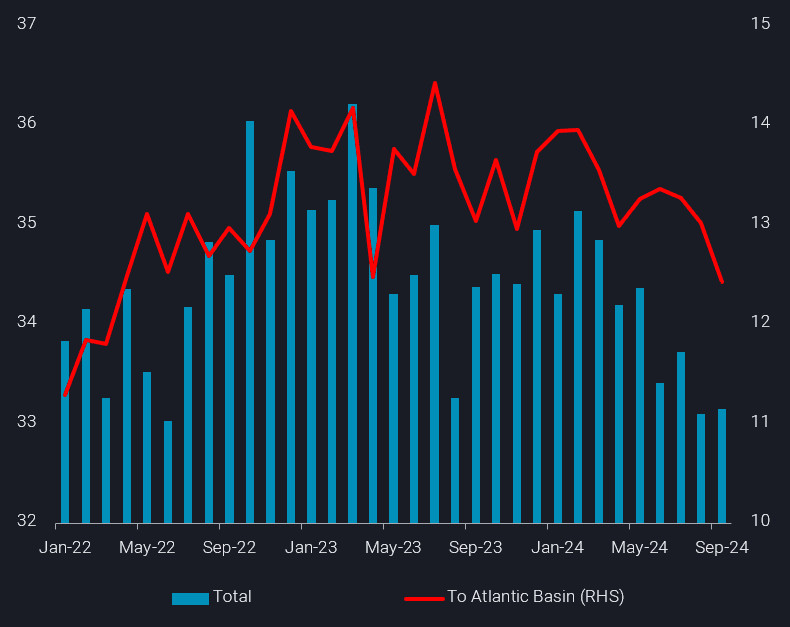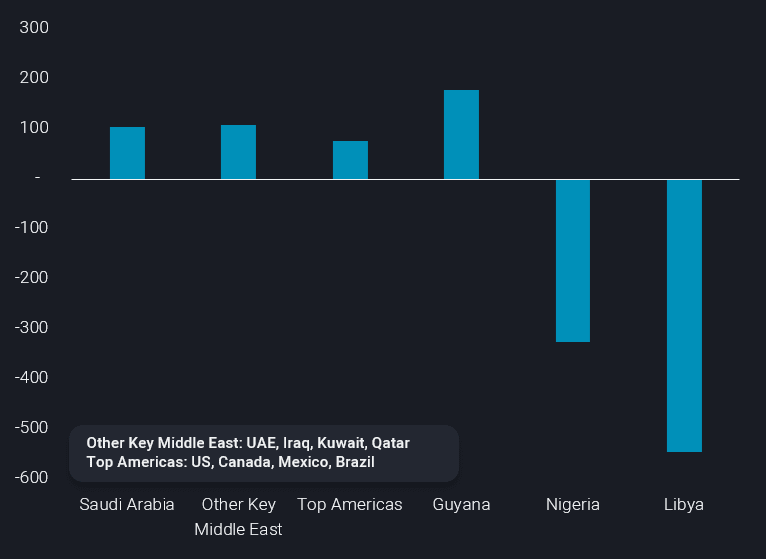Global crude export declines pause in September, but Atlantic Basin remains constrained
Global crude/condensate exports from non-sanctioned suppliers stood almost unchanged in September, despite sharp reductions from some key producers during the month. Slightly higher exports from Saudi Arabia and smaller contributions from others prevented total exports from falling below already historically low levels, but did not prevent exports pointed to the Atlantic basin reaching their lowest since April 2023.


Global crude/condensate exports excluding Russian, Iranian, and Venezuelan origin (LHS, mbd) vs exports to Atlantic Basin (RHS, mbd)
Global seaborne crude/condensate exports (excluding sanctioned supplies from Russia, Iran and Venezuela) totalled 33mbd in September, only 35kbd higher than the multiyear low set in August. Exports were almost flat in September as sharp declines from Libya and Nigeria more than offset smaller increases from the Middle East and Americas.
Saudi Arabia’s exports rose by around 100kbd m-o-m, coinciding with lower intra-country flows as the Kingdom reduced crude burn for power generation, with peak summer demand passing. Combined crude and residual fuel oil arrivals at selected Saudi ports (located close to key Saudi power gen-related sites) fell by 130kbd m-o-m in September and preliminary indications for October show arrivals falling even further.
Outside of Saudi Arabia, other Middle East producers posted much smaller m-o-m increases, or none at all in September, resulting in a combined 110kbd m-o-m rise across the rest of the region.
In the Americas region, the biggest change in September was the full return of Guyanese crude exports after maintenance works limited production during July-August. Other key producers in the Americas (US, Canada, Mexico and Brazil) added less than 100kbd extra in combined exports for September.


Selected origins’ m-o-m changes in September crude exports (kbd)
By far the biggest driver of tight global crude supply in September was Libya’s sharp reduction in exports, a cut of over 500kbd m-o-m. Prolonged field outages and force majeure at key load ports restricted exports for much of September but supplies are recovering now and at the latest reading for early October, puts total exports only 300kbd from normality. The re-introduction of Libyan crude will disproportionately help boost import activity in the Mediterranean market.
However, even with a quick and large return from Libya, this may not be enough to reverse the more structural shift in the slowdown of seaborne crude exports heading to the Atlantic Basin.
Behind Libya, the next largest m-o-m drop in September crude exports came from Nigeria, which is now increasingly supplying its recently commissioned 600kbd Dangote refinery.
Total Nigerian crude exports are 350kbd lower in September vs August and this drop could be a new step change lower for exports given recent news (Argus Media) of local currency sales of crude and products between state-owned NNPC and Dangote.
As this refinery continues to ramp up its runs and take rising volumes of domestic crude, this will put an even firmer cap on Atlantic Basin crude imports, unless the region turns to more costly and further afield cargoes from the Middle East. For many Western buyers, importing crude from the Middle East Gulf comes with the added freight costs of sailing via the Cape of Good Hope, to avoid the risk of attack in the Red Sea. More recently, this has been compounded by the perception of increased risk in sailing through the Straits of Hormuz, a crucial artery for 13mbd of crude/condensate flows, as geopolitical tensions in the region heat up.